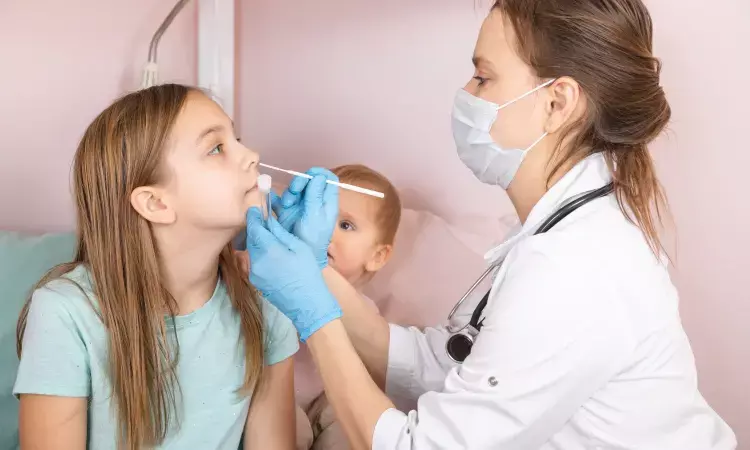- Home
- Medical news & Guidelines
- Anesthesiology
- Cardiology and CTVS
- Critical Care
- Dentistry
- Dermatology
- Diabetes and Endocrinology
- ENT
- Gastroenterology
- Medicine
- Nephrology
- Neurology
- Obstretics-Gynaecology
- Oncology
- Ophthalmology
- Orthopaedics
- Pediatrics-Neonatology
- Psychiatry
- Pulmonology
- Radiology
- Surgery
- Urology
- Laboratory Medicine
- Diet
- Nursing
- Paramedical
- Physiotherapy
- Health news
- Fact Check
- Bone Health Fact Check
- Brain Health Fact Check
- Cancer Related Fact Check
- Child Care Fact Check
- Dental and oral health fact check
- Diabetes and metabolic health fact check
- Diet and Nutrition Fact Check
- Eye and ENT Care Fact Check
- Fitness fact check
- Gut health fact check
- Heart health fact check
- Kidney health fact check
- Medical education fact check
- Men's health fact check
- Respiratory fact check
- Skin and hair care fact check
- Vaccine and Immunization fact check
- Women's health fact check
- AYUSH
- State News
- Andaman and Nicobar Islands
- Andhra Pradesh
- Arunachal Pradesh
- Assam
- Bihar
- Chandigarh
- Chattisgarh
- Dadra and Nagar Haveli
- Daman and Diu
- Delhi
- Goa
- Gujarat
- Haryana
- Himachal Pradesh
- Jammu & Kashmir
- Jharkhand
- Karnataka
- Kerala
- Ladakh
- Lakshadweep
- Madhya Pradesh
- Maharashtra
- Manipur
- Meghalaya
- Mizoram
- Nagaland
- Odisha
- Puducherry
- Punjab
- Rajasthan
- Sikkim
- Tamil Nadu
- Telangana
- Tripura
- Uttar Pradesh
- Uttrakhand
- West Bengal
- Medical Education
- Industry
COVID-19 Infection in Children tied to Long-Term Kidney Risks: JAMA

Researchers have found in a new study that pediatric COVID-19 infection is linked to a higher risk of adverse post-acute kidney outcomes, particularly in children with preexisting chronic kidney disease (CKD) or acute kidney injury (AKI). The infection was also associated with an increased risk of developing new-onset CKD up to two years later, highlighting the need for long-term kidney monitoring in affected children and adolescents.
It remains unclear whether children and adolescents with SARS-CoV-2 infection are at heightened risk for long-term kidney complications. A study was done to investigate whether SARS-CoV-2 infection is associated with an increased risk of postacute kidney outcomes among pediatric patients, including those with preexisting kidney disease or acute kidney injury (AKI).
This retrospective cohort study used data from 19 health institutions in the National Institutes of Health Researching COVID to Enhance Recovery (RECOVER) initiative from March 1, 2020, to May 1, 2023 (follow-up ≤2 years completed December 1, 2024; index date cutoff, December 1, 2022). Participants included children and adolescents (aged <21 years) with at least 1 baseline visit (24 months to 7 days before the index date) and at least 1 follow-up visit (28 to 179 days after the index date).
Outcomes included new-onset chronic kidney disease (CKD) stage 2 or higher or CKD stage 3 or higher among those without preexisting CKD; composite kidney events (≥50% decline in estimated glomerular filtration rate [eGFR], eGFR ≤15 mL/min/1.73 m2, dialysis, transplant, or end-stage kidney disease diagnosis), and at least 30%, 40%, or 50% eGFR decline among those with preexisting CKD or acute-phase AKI. Hazard ratios (HRs) were estimated using Cox proportional hazards regression models with propensity score stratification.
Results Among 1 900 146 pediatric patients (487 378 with and 1 412 768 without COVID-19), 969 937 (51.0%) were male, the mean (SD) age was 8.2 (6.2) years, and a range of comorbidities was represented. SARS-CoV-2 infection was associated with higher risk of new-onset CKD stage 2 or higher (HR, 1.17; 95% CI, 1.12-1.22) and CKD stage 3 or higher (HR, 1.35; 95% CI, 1.13-1.62). In those with preexisting CKD, COVID-19 was associated with an increased risk of composite kidney events (HR, 1.15; 95% CI, 1.04-1.27) at 28 to 179 days.
Children with acute-phase AKI had elevated HRs (1.29; 95% CI, 1.21-1.38) at 90 to 179 days for composite outcomes. In this large US cohort study of children and adolescents, SARS-CoV-2 infection was associated with a higher risk of adverse postacute kidney outcomes, particularly among those with preexisting CKD or AKI, suggesting the need for vigilant long-term monitoring.
Reference:
Li L, Zhou T, Lu Y, et al. Kidney Function Following COVID-19 in Children and Adolescents. JAMA Netw Open. 2025;8(4):e254129. doi:10.1001/jamanetworkopen.2025.4129
Dr. Shravani Dali has completed her BDS from Pravara institute of medical sciences, loni. Following which she extensively worked in the healthcare sector for 2+ years. She has been actively involved in writing blogs in field of health and wellness. Currently she is pursuing her Masters of public health-health administration from Tata institute of social sciences. She can be contacted at editorial@medicaldialogues.in.
Dr Kamal Kant Kohli-MBBS, DTCD- a chest specialist with more than 30 years of practice and a flair for writing clinical articles, Dr Kamal Kant Kohli joined Medical Dialogues as a Chief Editor of Medical News. Besides writing articles, as an editor, he proofreads and verifies all the medical content published on Medical Dialogues including those coming from journals, studies,medical conferences,guidelines etc. Email: drkohli@medicaldialogues.in. Contact no. 011-43720751


